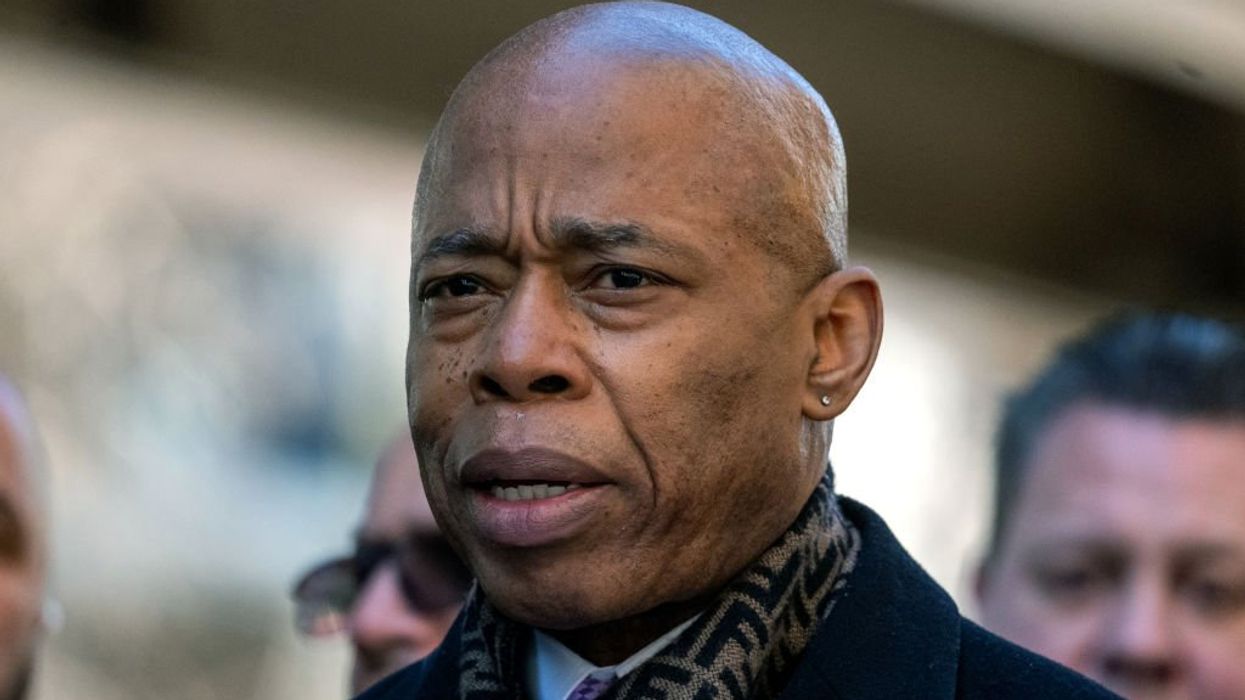© 2024 Blaze Media LLC. All rights reserved.
The Latest Move by North Korea That Shows It Could Be Serious About New Conflict
April 08, 2013
"The zone is now in the grip of a serious crisis."
 South Korean army soldiers pass by a barbed-wire fence during an exercise against possible attacks by North Korea in Paju near the demilitarized zone between the two Koreas, South Korea,Thursday, March 21, 2013. North Korea has threatened revenge for the sanctions and for ongoing U.S.-South Korean military drills, which the allies describe as routine but which Pyongyang says are rehearsals for invasion. Credit: AP
South Korean army soldiers pass by a barbed-wire fence during an exercise against possible attacks by North Korea in Paju near the demilitarized zone between the two Koreas, South Korea,Thursday, March 21, 2013. North Korea has threatened revenge for the sanctions and for ongoing U.S.-South Korean military drills, which the allies describe as routine but which Pyongyang says are rehearsals for invasion. Credit: AP
SEOUL, South Korea (AP) -- North Korea said Monday it will suspend operations at a factory complex it has jointly run with South Korea, pulling out more than 53,000 North Korean workers and moving closer to severing its last economic link with its rival as tensions escalate.
The Kaesong industrial complex is the biggest employer in North Korea's third-largest city, and shutting it down, even temporarily, would show that the destitute country is willing to hurt its own economy to display its anger with South Korea and the United States.
Pyongyang's move follows weeks of threatening rhetoric and provocations aimed at Seoul and its U.S. ally following U.N. sanctions punishing the North for its third nuclear test, on Feb. 12. In recent days there have also been signs in Seoul pointing to an even larger provocation from Pyongyang, including another possible nuclear test or rocket launch.
The point of the threats and possible future provocations, analysts say, isn't a full-scale war, which North Korea would certainly lose. It's seen instead as an effort to force new, Pyongyang-friendly policies in South Korea and Washington and to boost domestic loyalty for Kim Jong Un, the country's young, still relatively untested new leader.
The statement about Kaesong came from Kim Yang Gon, secretary of a key decision-making body, the Central Committee of the Workers' Party of Korea. It did not say what would happen to the 475 South Korean managers still at the Kaesong industrial complex. The statement also did not say whether the North Korean workers would be recalled immediately, and a South Korean manager at Kaesong said he had heard nothing from the North Korean government.
"North Korean workers left work at 6 o'clock today as they usually do. We'll know tomorrow whether they will come to work," said the manager, who declined to be identified because he was not allowed to speak to media. North Korea had asked South Korean managers to say when they intended to leave by Wednesday; the manager said he did not know whether he and his South Korean colleagues now will be forced to leave.
Members of South Korea's Unification Ministry, which is responsible for relations with the North, were meeting Monday to discuss the South Korean managers' status but had yet to issue a statement.
The Kaesong complex is the last remaining symbol of inter-Korean rapprochement projects. Other cooperation projects such as reunions of families separated by war and tours to a scenic North Korean mountain became stalled amid confrontation between the rival Koreas in recent years.
The complex combines cheap North Korean labor and South Korean know-how and technology. It is the last remaining inter-Korean rapprochement project from previous eras of cooperation. It is also a rare source of foreign cash for North Korea. South Korea's Unification Ministry estimates that North Korean workers in Kaesong received $80 million in salary in 2012.
North Korea previously cut the communications with South Korea that had helped regulate border crossings, then last week barred South Korean workers and cargo from entering North Korea. Operations continued and South Koreans already at Kaesong were allowed to stay, but dwindling personnel and supplies had forced about a dozen of the more than 120 companies operating at Kaesong to close by Sunday.
"The zone is now in the grip of a serious crisis," Kim said in remarks carried by the Korean Central News Agency. He said it "has been reduced to a theater of confrontation with fellow countrymen and military provocation, quite contrary to its original nature and mission."
"It is a tragedy that the industrial zone which should serve purposes of national reconciliation, unity, peace and reunification has been reduced to a theatre of confrontation between compatriots and war against the North," said Kim, who visited the complex Monday.
Kaesong is a rare source of foreign cash for North Korea. South Korea's Unification Ministry estimates 53,000 North Korean workers in Kaesong received $80 million in salary in 2012.
North Korea, however, objects to portrayals in the South of the zone being crucial to the impoverished country's finances. Kim said North Korea "gets few economic benefits from the zone while the south side largely benefits from it."
South Korea's finance minister, Hyun Oh-seok, said Monday that it is "quite ridiculous" for North Korea to be closing the border at Kaesong. "North Korea has nothing to gain from these kind of things," he said at a news briefing.
Hyun said the government is looking at ways to help Kaesong firms.
A South Korean worker in Kaesong reached by the Associated Press on the phone said she did not know if North Korean workers would come to work Tuesday. She also said she didn't know when she would return to the South.
"Everyone left work (for their living quarters at Kaesong) before we heard the news from North Korea," she said, declining to be identified because she was not allowed to speak to reporters without authorization.
Daemyung Blue Jeans Inc., which does business in Kaesong, has not received any news from North Korea, CEO Choi Dongjin said. He said he heard news of the withdrawal on TV. He said he was trying to get in touch with his managers in Kaesong and hadn't spoken with them since Monday morning.
"We have seven (South Korean) workers in Kaesong. We don't know what to do about them," Choi, who is in Seoul, said by phone.
North Korea has unnerved the international community by orchestrating an escalating campaign of bombast in recent weeks. It has threatened to fire nuclear missiles at the U.S. and claimed it had scrapped the 1953 armistice that ended fighting in the Korean War.
Last week it told foreign diplomats based in Pyongyang that it will not be able to guarantee their safety as of Wednesday. Embassy workers appeared to be staying put as of Monday but foreign ministries around the world were continuing to evaluate the situation.
Yet it has found itself increasingly isolated. China, its most important ally, drafted the U.N. sanctions with the U.S. and expressed unusual disappointment when Pyongyang announced last week that it was restarting a plutonium reactor to produce more nuclear-bomb fuel.
Russian President Vladimir Putin, during a visit to Germany, said at a press conference that a conflict on the Korean Peninsula would make the nuclear disaster at Chernobyl "look like a children's story." He praised the U.S. for postponing a missile test in California that had been set for this week, in the name of lowering tensions.
The North's threats against the United States are widely dismissed as hyperbole. North Korea is believed to have a handful of relatively crude nuclear weapons, but analysts say they've seen no evidence it can build a warhead small enough to put on a missile that could hit the U.S. mainland. A direct attack on the U.S. or its allies would result in retaliation that would threaten the existence of the ruling Kim family in Pyongyang, but there are fears the North could launch a smaller-scale attack.
Another possibility is a fourth nuclear test, or a missile test.
The South Korean defense minister said Thursday that North Korea had moved a missile with "considerable range" to its east coast, possibly to conduct a test launch. His description suggests that the missile could be a Musudan missile, capable - on paper at least - of striking American bases in Guam with its estimated range of up to 4,000 kilometers (2,490 miles).
Pyongyang's warning to diplomats prompted South Korean President Park Geun-hye's national security director to say Sunday that North Korea may be planning a missile launch or another provocation around Wednesday, according to presidential spokeswoman Kim Haing.
During a meeting with other South Korean officials, the official, Kim Jang-Soo, also said the notice to diplomats and other recent North Korean actions are an attempt to stoke security concerns and to force South Korea and the U.S. to offer a dialogue. Washington and Seoul want North Korea to resume the six-party nuclear talks - which also include China, Russia and Japan - that it abandoned in 2009.
The possibility that North Korea would conduct a fourth nuclear test has existed for some time. South Korea has long said the North prepared two tunnels for a nuclear test, but used only one Feb. 12.
Unification Minister Ryoo Kihl-jae generated confusion about South Korean intelligence on the issue Monday in a parliamentary session. When a lawmaker asked whether there was an indication of increased personnel and vehicles at the North's nuclear test site, Ryoo said "there is such an indication."
After Ryoo's initial comments, South Korean Defense Ministry spokesman Kim Min-seok said there are vehicle and personnel activities at the northeastern test site but they are seen as "usual" activities, not an "indication for a nuclear test." Kim said North Korea can conduct a nuclear test anytime if decides to do so.
The comments in a parliamentary session were recorded on video, but Ryoo later told lawmakers he couldn't remember making them and didn't mean to say them. He said he was "startled" by reports carrying his earlier comments.
---
AP Business Writer Youkyung Lee and AP researcher Zhao Liang in Beijing contributed to this report.
Want to leave a tip?
We answer to you. Help keep our content free of advertisers and big tech censorship by leaving a tip today.
Want to join the conversation?
Already a subscriber?
more stories
Sign up for the Blaze newsletter
By signing up, you agree to our Privacy Policy and Terms of Use, and agree to receive content that may sometimes include advertisements. You may opt out at any time.
© 2024 Blaze Media LLC. All rights reserved.
Get the stories that matter most delivered directly to your inbox.
By signing up, you agree to our Privacy Policy and Terms of Use, and agree to receive content that may sometimes include advertisements. You may opt out at any time.


